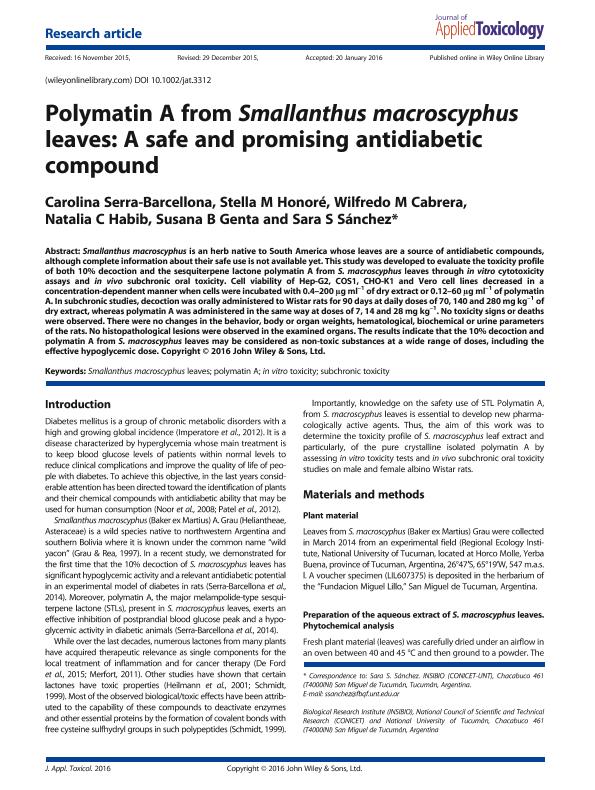Artículo
Polymatin A from Smallanthus macroscyphus leaves: A safe and promising antidiabetic compound
Serra Barcellona, Carolina ; Honore, Stella Maris
; Honore, Stella Maris ; Cabrera, Wilfredo Marcelino; Habib, Natalia Cecilia
; Cabrera, Wilfredo Marcelino; Habib, Natalia Cecilia ; Genta, Susana Beatriz de Fátima; Sanchez, Sara Serafina del V.
; Genta, Susana Beatriz de Fátima; Sanchez, Sara Serafina del V.
 ; Honore, Stella Maris
; Honore, Stella Maris ; Cabrera, Wilfredo Marcelino; Habib, Natalia Cecilia
; Cabrera, Wilfredo Marcelino; Habib, Natalia Cecilia ; Genta, Susana Beatriz de Fátima; Sanchez, Sara Serafina del V.
; Genta, Susana Beatriz de Fátima; Sanchez, Sara Serafina del V.
Fecha de publicación:
11/2016
Editorial:
John Wiley & Sons Ltd
Revista:
Journal of Applied Toxicology
ISSN:
0260-437X
Idioma:
Inglés
Tipo de recurso:
Artículo publicado
Clasificación temática:
Resumen
Smallanthus macroscyphus is an herb native to South America whose leaves are a source of antidiabetic compounds, although complete information about their safe use is not available yet. This study was developed to evaluate the toxicity profile of both 10% decoction and the sesquiterpene lactone polymatin A from S. macroscyphus leaves through in vitro cytotoxicity assays and in vivo subchronic oral toxicity. Cell viability of Hep-G2, COS1, CHO-K1 and Vero cell lines decreased in a concentration-dependent manner when cells were incubated with 0.4–200 μg ml–1 of dry extract or 0.12–60 μg ml–1 of polymatin A. In subchronic studies, decoction was orally administered to Wistar rats for 90 days at daily doses of 70, 140 and 280 mg kg–1 of dry extract, whereas polymatin A was administered in the same way at doses of 7, 14 and 28 mg kg–1. No toxicity signs or deaths were observed. There were no changes in the behavior, body or organ weights, hematological, biochemical or urine parameters of the rats. No histopathological lesions were observed in the examined organs. The results indicate that the 10% decoction and polymatin A from S. macroscyphus leaves may be considered as non-toxic substances at a wide range of doses, including the effective hypoglycemic dose. Copyright © 2016 John Wiley & Sons, Ltd.
Archivos asociados
Licencia
Identificadores
Colecciones
Articulos(INSIBIO)
Articulos de INST.SUP.DE INVEST.BIOLOGICAS
Articulos de INST.SUP.DE INVEST.BIOLOGICAS
Citación
Serra Barcellona, Carolina; Honore, Stella Maris; Cabrera, Wilfredo Marcelino; Habib, Natalia Cecilia; Genta, Susana Beatriz de Fátima; et al.; Polymatin A from Smallanthus macroscyphus leaves: A safe and promising antidiabetic compound; John Wiley & Sons Ltd; Journal of Applied Toxicology; 36; 11; 11-2016; 1516-1525
Compartir
Altmétricas



